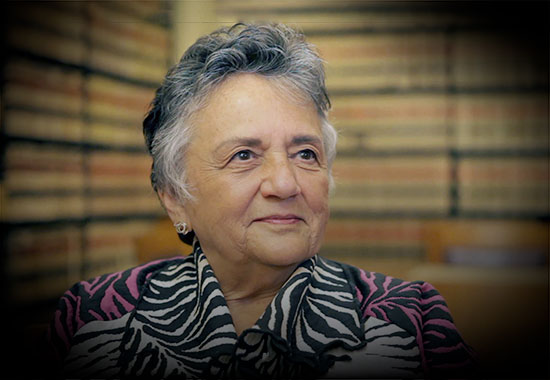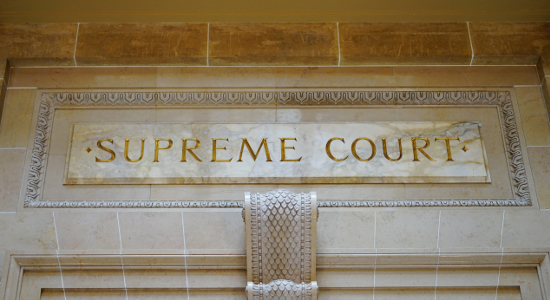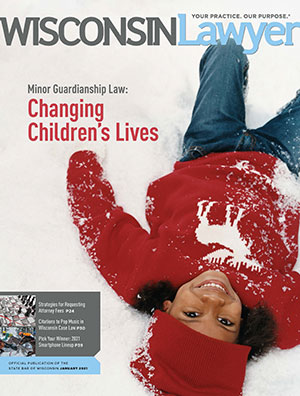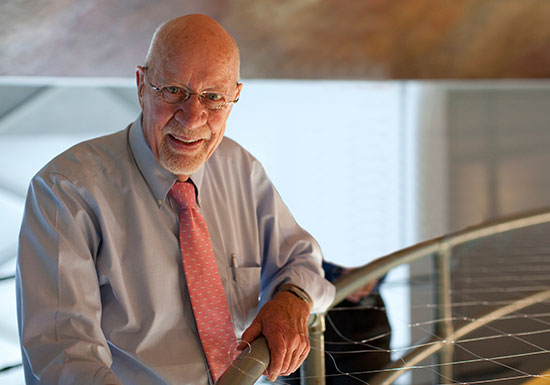Justice Shirley Abrahamson: Walking in Others’ Shoes

A great legal mind has left our midst. Justice Shirley Abrahamson was one of the greatest. When asked to share some thoughts, Sen. Tammy Baldwin said of Justice Abrahamson: “She understood that you can’t serve the people if you don’t walk in their shoes.” I have firsthand knowledge of this.
In February 2009, I made my way to the Wisconsin Supreme Court prepared with one page of arguments to give the justices my opinion on a proposed rule that could potentially change my life forever.
At the time, I had been in Wisconsin for five years, and I had been licensed as an attorney since 1990. However, even with an LLM from the University of Pennsylvania Law School, I could not practice in the state because my JD was from Mexico. According to the Wisconsin Supreme Court Rules, I was not allowed to seek permission to sit for the bar exam.
For the two years before February 2009, the Board of Bar Examiners embarked on the process of drafting a new supreme court rule that would pave the way for lawyers from foreign countries to sit for the bar. The BBE submitted its final proposal, and the court scheduled the matter to be heard during an administrative conference. I wrote up my argument and drove to Madison. When I got there, I signed up as a participant and waited for my opportunity to address the court.
The experience was exhilarating and nerve wracking. I presented my suggestion on what I believed to be the most appropriate language for the proposed rule. The justices then asked questions; some were speed balls; some were softer punts. And at the end, Justice Abrahamson said something along these lines:
“Ms. Herber, regardless of what this court decides should be the outcome of the petition to modify the SCR, I do want to thank you for showing up today and sharing your story. It is often that this court meets to decide on matters that affect real people living real lives, and yet, mostly we never see the people whose lives we affect. It is always nice to put a face to a name.”
Two years later, in November 2011, I appeared before the court again, this time to be sworn in as a member of the newest group of Wisconsin lawyers. After the ceremony I approached Justice Abrahamson. I started by saying, “Your honor, you will not remember me, but I was last in this room during the administrative hearing to change the SCR related to lawyers with law degrees from foreign countries.…” And before I could finish, she said, “Of course I remember you. It’s nice to see your face again. Congratulations on your achievement.”
And today, with that memory fresh in my mind, I echo Sen. Baldwin’s remarks. Justice Abrahamson knew the people of Wisconsin; she understood them.
May her memory be a blessing and her life an inspiration.
Cynthia R. Herber
Formerly of Milwaukee, currently in New Mexico
We Want to Hear from You! Submit a Letter to the Editor
Wisconsin Lawyer provides a forum for members to express ideas, concerns, and opinions on law-related subjects. Send comments to wislawyer@wisbar.org (include “Letters” in the subject line), or mail to Wisconsin Lawyer “Letters,” P.O. Box 7158, Madison, WI 53707-7158. Limit to 500 words. Writing guidelines available.
Connect With Us Online. Post comments to articles
online, and find us on Facebook, Twitter, LinkedIn, YouTube, and Instagram.
Serve on a Supreme Court Committee: Deadline March 31

The Wisconsin Supreme Court appoints lawyers and nonlawyers to several committees and boards that serve the legal profession.
For lawyers, these appointments include positions on committees in the Office of Lawyer Regulation, the Access to Justice Commission, the Judicial Commission, and the Board of Bar Examiners.
If you are interested in seeking an appointment, please submit your resumé and letter of interest before March 31, 2021, to be considered in the next round of nominations.
Nominations for these positions are made to the Supreme Court’s Appointment Selection Committee. The Appointment Selection Committee then makes recommendations to the supreme court, which ultimately approves and finalizes the appointments. (The Appointment Selection Committee is made up of 12 people serving various constituencies.)
Appointments are made on a continual basis as openings arise. The Appointment Selection Committee generally meets in April and September to evaluate nominations and make recommendations to the supreme court.
To learn more about supreme court-appointed committees and boards, and to apply for an appointment, please visit the Wisconsin Court System’s website, www.wicourts.gov/courts/committees/participate.htm. Applications are due before March 31.
Questions? Contact me.
Anna Yarish
Director of State Courts Office, Madison
(608) 266-1298
Giving Law Students Earlier Court Experience

In “Law Students Get Earlier Court Experience under Proposed Rule Change” (InsideTrack, Jan. 6, 2021), Joe Forward described the Wisconsin Access to Justice Commission petition (20-04) to amend Supreme Court Rule chapter 50, which governs the practical training of law students.
He wrote, “Expanding the law student practice rule also increases access to justice in Wisconsin while promoting greater diversity in the legal profession, according to the petition.”
A reader posted a comment.
Reader: Totally in favor of this rule. I benefited from Ohio’s law student rule while at CWRU [Case Western Reserve University] in 1990. I participated in a health care legal clinic and represented, with supervision, a client in a Social Security appeal, a circuit court collections matter, and an insurance denial appeal. I was very pleased that we prevailed in all of those matters, providing me with substantial confidence in my legal abilities even before I graduated.
Francine Felske
Who Can Own a Law Firm?
I read Dean Dietrich’s article, “Law Firms: Who Can and Can’t Be Owners?” (Wisconsin Lawyer, Dec. 2020), with interest. I encourage Wisconsin lawyers to recall the cautionary tale of medicine when considering expanding the role of nonlawyers to include economic interest or decision-making authority in law firms.
In medicine, non-physicians entered administrative roles under the guise of reducing administrative time required of physicians in order to free them to spend their time providing care. Once profit entered as a motive, however, physicians were soon relegated to the status of employee, and standards of care became driven by insurance companies and the bottom line. For a sobering review of the extent to which this has impacted healthcare, I recommend Money-Driven Medicine: The Real Reason Health Care Costs So Much, by Maggie Mahar.1 She astutely observes that, “physicians have been stripped of their standing as professionals.”
Chief executive officer compensation for “nonprofit” medical centers increased 93 percent between 2005 and 2015, and nonclinical workers and managers account for 34 percent of the increase in healthcare worker wages over this time.2 Not surprisingly, entities that spend more money on administration costs provide lower quality care,3 and the overall percentage of adults reporting worse health has increased between 2011 and 2017.4
While physicians fortunate enough to practice in an academic setting have been spared much of this struggle, given this general de-professionalism of medicine, it is small wonder that 42 percent of physicians are burned out.5 Wisconsin lawyers would do well to take claims of noble motive from nonlawyers who seek to profit from or provide legal services with a sizeable grain of salt.
1 Maggie Mahar, Money-Driven Medicine: The Real Reason Health Care Costs So Much (Harper Collins, 2006).
2 Jerry Y. Du et al., The Growing Executive-Physician Wage Gap in Major US Nonprofit Hospitals and Burden of Nonclinical Workers on the US Healthcare System, Clin Orthop Relat Res., 476(10):1910-19 (Oct. 2018).
3 David U. Himmelstein & Steffie Woolhandler, Taking Care of Business: HMOs That Spend More on Administration Deliver Lower-quality Care, Int J Health Serv., 32(4):657-67 (2002).
4 Marco Ramirez et al., How Has the Quality of the U.S. Healthcare System Changed Over Time? Peterson-KFF Health System Tracker (April 17, 2019).
5 Medscape’s 2020 Physician Burnout Report Finds Main Causes and Coping Mechanisms Differ by Generation, PR Newswire (Jan. 15, 2020).
Robert P. Lennon, MD, JD, FAAFP
Assoc. Prof. of Family & Community Medicine
Penn State College of Medicine/Milton S. Hershey Medical Center
Read the Technology Company Terms of Service for Users

In “Google Local Services Ads for Lawyers: Caveat Advocatum (Lawyer Beware)” (InsideTrack, Jan. 6, 2021), State Bar ethics counsel Aviva Meridian Kaiser wrote, “Lawyers have raised the question on whether a lawyer’s participating in Local Services Ads on Google is consistent with the lawyer’s duty of confidentiality.”
To participate in the Local Services Ads (LSAs), lawyers must “authorize Google, its affiliates, and their agents to access, monitor, and record telephone calls, text messages, live chat, and other communications” initiated through the LSAs. Thus the question of confidentiality.
Kaiser posted an update to the article.
Update: On Monday [Jan. 4, 2021], the Massachusetts Supreme Judicial Court, in Kauders v. Uber Technologies Inc., raised substantial concerns regarding terms of service imposed on users by technology companies without providing clear notice that they were doing so. The opinion contains a thorough analysis of the app’s interface for drivers and the app’s interface for users (riders). The court observed: “The contrast between the notice provided to drivers and that provided to users is telling. As Uber is undoubtedly aware, most of those registering via mobile applications do not read the terms of use or terms of service included with the applications.”
Aviva Meridian Kaiser
State Bar of Wisconsin
Ethics Hotline (800) 254-9154
Good Writing, Editing Always Welcome
 Without pointing to each piece or author, I just thought you’d want to know that, at least in my humble opinion, the coverage and writing on the WisBar website, in InsideTrack, and in the Wisconsin Lawyer magazine has been top-flight, particularly within so many of the pieces lately on the unique appellate opinions like the elections. Well-chosen opinions and topics and written with simple (but difficult to pull off) clarity, accuracy, and balance.
Without pointing to each piece or author, I just thought you’d want to know that, at least in my humble opinion, the coverage and writing on the WisBar website, in InsideTrack, and in the Wisconsin Lawyer magazine has been top-flight, particularly within so many of the pieces lately on the unique appellate opinions like the elections. Well-chosen opinions and topics and written with simple (but difficult to pull off) clarity, accuracy, and balance.
I’m not an expert, but I clerked for Judge Gartzke (a Phi Beta Kappa Harvard Law-trained jurist who had a great eye for good writing and did not suffer hacks gladly) and more recently for Chief Judge Lisa Neubauer (who we all know is stratospherically smart), and I wrote a bit myself in The Law of Damages. By osmosis or otherwise, I learned something about appellate opinions and the reporting on them. By and by, from different periodicals, the court reporting sometimes sputtered and flunked, whether biased, flat-out wrong, or plainly bypassing the big picture, having become fixated on some bit of minutiae. When reading such pieces, Judge Gartzke would often mark down in the margin his favorite annotation for such writing, “BAH!”
Criticism is needed and important, but too often we ignore or fail to highlight works of consistent quality and genuine merit. I look forward to the next slate of articles. Thanks for your hard work, as it’s clearly paying off.
Allen M. Ratkowski
Matthiesen, Wickert & Lehrer S.C., Franklin
Fred Risser: Many Years of Legislative Service

I just read Joe Forward’s article “Fred Risser’s Watchful Eye: Reflections on Legislative Service” (Wisconsin Lawyer, Dec. 2020), and thought it was excellent. I worked for Fred in the Capitol from 2007 to 2009 and have always followed his write-ups in various publications, especially those about his longevity. I thought the piece in Wisconsin Lawyer was one of the best I’ve seen. There were a number of tidbits in there about Fred’s early legislative and legal career that I was not aware of. Good job researching the legislative history of his career. Well done.
Wes Webendorfer
DeWitt LLP, Madison
